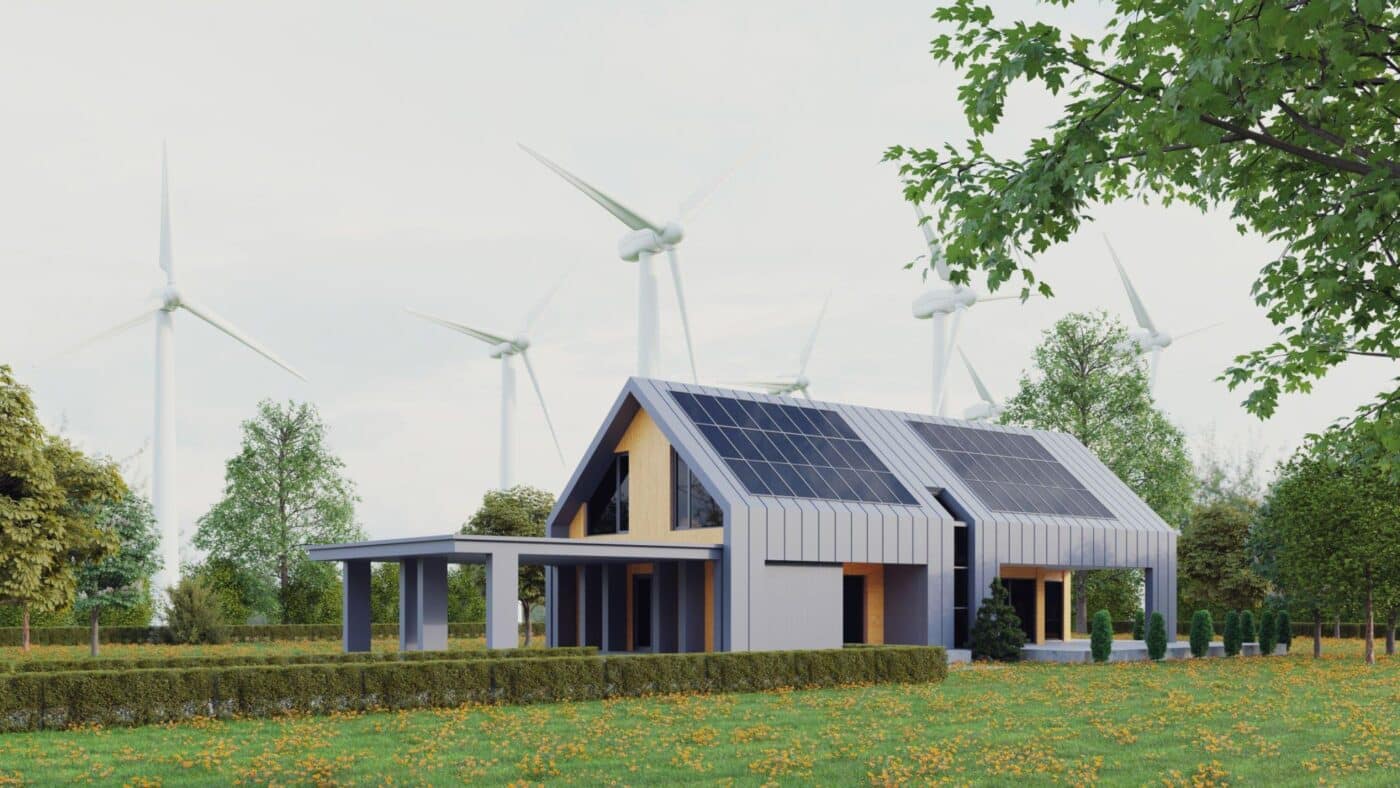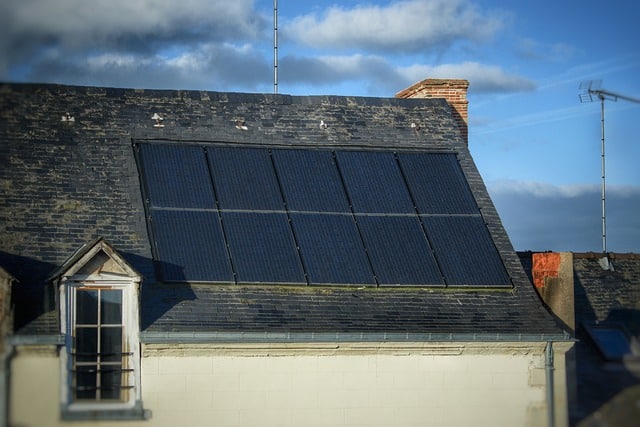The advantages and disadvantages of solar energy are a hot topic today. If you’re considering adding solar to your home or business, read on as our guide to the advantages and disadvantages of solar energy can help you decide if this is a sustainable option for you.

What Is Solar Energy and How Does It Work?
Solar energy is thermal energy and electrical energy converted from the sun’s energy. It is an endless renewable energy source. Solar technology has many uses, including power generation, hot water supply, outdoor lighting, mobile charging, heating and more.
Before we discuss the advantages and disadvantages of solar energy, we also need to understand how it works.
When sunlight hits a solar panel, the panel captures the sun’s energy. The photovoltaic cells on the surface of the panel absorb photons in sunlight. The absorption of photons excites the electrons in the photovoltaic cells, causing them to jump from a low energy level to a high energy level.
Through the photoelectric effect, high-energy-level electrons form a current that flows to the current electrode of the battery panel, thereby generating usable DC power that can be used to power homes, industrial equipment, or be stored in batteries.
The working process of solar energy is simple, clean, efficient and does not involve dependence on fossil fuels, making solar energy an important part of sustainable development. In the following articles, we’ll take a closer look at the advantages and disadvantages of solar energy.
Top Advantages and Disadvantages of Solar Energy
Here is a list of the main advantages and disadvantages of solar energy that you should weigh before deciding whether to install a solar system for your home or factory:
| Advantages of Solar Energy | Disadvantages of Solar Energy |
| It lowers your electric bills | It doesn’t work for every roof |
| It can improve your home value | It might not be worth it if you’re moving soon |
| It reduces your carbon emissions | Low electric bills mean low savings |
| It protects against rising electricity costs | It can cost a lot upfront |
| You can sometimes earn money | It won’t work at night |
| It works in most environments | Solar panels can contain toxic metals |
| It usually doesn’t require much maintenance | It can seem challenging to find the right installer |

Advantages of Solar Energy
Solar Energy Is A Renewable Energy Source and Reduces Carbon Emissions
Solar energy is an inexhaustible renewable energy source that can be used in all areas and every day. According to scientists, we can still use sunlight for at least 5 billion years while the sun is dying. Not only that, solar energy is also a clean energy source that does not produce additional carbon emissions and other greenhouse gases, avoiding the environmental damage caused by fossil fuel extraction or drilling.
Solar Energy Can Reduce Your Home’s Electricity Bill
Powering your home with electricity generated by a solar system can help you reduce your reliance on the grid, thereby reducing your electric bill. You can even sell excess power to utility companies or related agencies.
Solar Energy Can Lead to Energy Independence
Homes that rely solely on solar energy have the ability to operate completely off-grid, and the solar battery system can also transform the solar system into an emergency backup system during a power outage.
Solar Panels Increase Home Values
Typically, homes with solar systems sell for four percent more than homes without them. Considering that solar energy can also save money on electricity bills and make money when reselling, the value of solar energy systems is already very high. But if you opt for a solar lease, the advantages will be taken advantage of by your solar provider, so it requires you to carefully consider whether a solar system is worth it.
Solar Panels Have Low Maintenance Costs
Solar systems generally don’t require a lot of maintenance, and as long as they’re not affected by the elements, you just need to keep the panels clean and in good working order for them to continue to function.
The average lifespan of solar panels is 25 years, and professional panel maintenance services can cost between $140-180, while annual cleaning inspections cost about $150, but typically the solar system’s warranty will include a performance guarantee. Therefore, investing in a solar system is easily worth your money.
Solar Energy Can Generate Electricity in Any Climate
Solar energy systems can generate electricity in any climate, but climate will affect power generation efficiency. For example, cloudy days will reduce power generation. Plus, the cold won’t affect productivity, and snowy weather can help you clean your solar system, while the sunlight reflected from the snow increases the amount of light that hits the panels, producing more electricity.

Disadvantages of Solar Energy
The High Initial Costs of Installing Panels
Although the cost of solar panels has dropped over the past decade, installing a complete solar system still comes with a higher cost. Today, consumers can expect to pay about $18,000 for a complete solar installation for their home before taking into account any incentives and tax credits, with a typical home installation rarely exceeding $2,000.
Solar Energy Storage Is Expensive
One of the most expensive parts of the system is the battery for solar storage, which alone can cost up to $5,000. Since solar cells can store excess energy generated by solar panels, they are a great solution for being able to use solar energy throughout the day. Currently, a single lead-acid battery may cost between $200 and $800, while a residential lithium-ion solar system may cost $7,000 to $14,000.
Solar Efficiency Depends on Weather
Solar energy requires sunlight to generate electricity. Although solar energy can be collected on cloudy and rainy days, the system efficiency will be significantly reduced. Therefore, in countries with limited sunlight year-round, alternative renewable resources such as geothermal energy and hydroelectricity may work better. If you plan to power your home entirely from the sun, you’ll need to install energy storage batteries for your solar system.
Solar Doesn’t Work for Every Roof Type
Not all roofs are suitable for solar panels. If your roof doesn’t face the sun, you won’t be able to capture enough solar energy. Additionally, roofs that are angled away from the sun tend to perform better than flat roofs.
Future Outlook for Solar Energy
The past few years have seen a steady increase in the popularity of solar power, one of the most reliable and abundant energy sources on Earth.Therefore, it is expected that solar energy will remain an important player in the clean energy field for a long time to come. Here are some key trends for the future of solar energy:
- Technological innovation: Solar technology continues to innovate, solar cell efficiency is improved, and costs are reduced. The solar energy industry is developing rapidly.
- Smart grid: The combination of solar energy and smart grid will provide more flexible solutions for energy distribution, storage and management, and achieve efficient use of energy.
- Sustainable urban development: Solar energy development echoes the core of sustainable urban development. The spread of building-integrated solar systems, solar lighting and transportation will make cities more sustainable and environmentally friendly.
- Global Accessibility: The global accessibility of solar energy will lead to the adoption of solar technology in more areas, especially in remote areas and developing countries, where solar energy will become a reliable energy option.
Conclusion
The advantages of solar energy are evident, ranging from economic benefits to environmental contributions, inspiring optimism. Despite some challenges faced by disadvantages of solar energy, the promising outlook of technological innovations is uplifting. In the future, solar energy will become more widespread and become a key component of our energy mix.
If you have solar system installation needs, choose GYCX Solar, we are committed to providing you with efficient and reliable solar solutions. Let’s move towards a greener and more sustainable tomorrow together. Contact us to create a clean energy future together!

FAQ
Should We Still Invest in Solar Energy?
Yes. From nuclear to fossil fuels to renewable resources, they all have their pros and cons, and solar energy is no exception. Before investing, we need to evaluate the energy sources to select the most suitable ones with the greatest benefits. Solar panels rely on sunlight, which may not be the best option for northern countries due to their lack of sunlight year-round. But it is undeniable that solar energy still has unlimited potential, it is a better alternative to environmentally unfriendly fossil fuels, and it is our best chance of stopping global warming.
What Are the Top Advantages of Solar Energy?
Solar energy can reduce your energy bill, increase your home value, reduce carbon emissions, prevent energy bill increases, and help you recoup your investment. Solar panels are also fairly low maintenance. What they need most is occasional cleaning.
Are There Negative Effects of Solar Energy?
There aren’t many negatives to solar energy. Solar energy development echoes the core of sustainable urban development and is environmentally friendly, as solar energy does not release greenhouse gases into the atmosphere. It’s important to note that some solar panels may contain toxic heavy metals such as lead and cadmium, which may leach into the environment if not handled properly.
Do Solar Panels Increase Your Property Taxes?
Yes. But solar panels will increase the value of your home, while also increasing your property taxes. Please go ahead and check local websites for the most accurate and up-to-date information.
